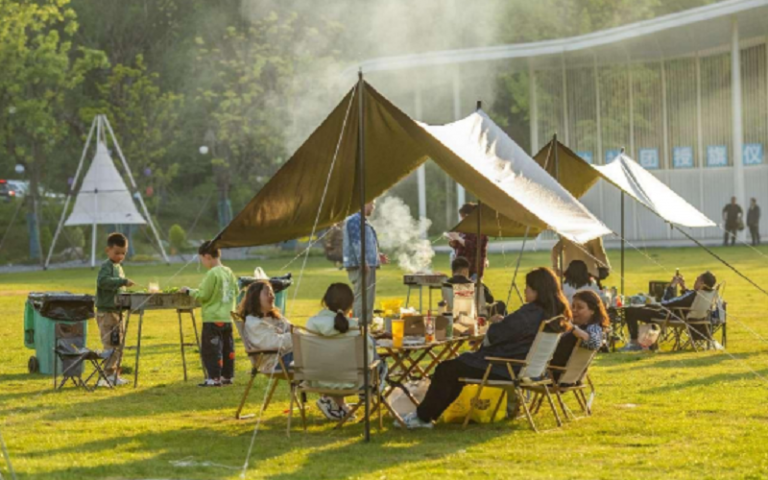
By Ji Juesu, “Ten more lamb skewers please!” On a Saturday night, laughter and greetings echoed from tents along Dianshan Lake in Qingpu district, east China’s Shanghai.
“Coming right up,” Shi Lina, the campsite manager, shouted back as she cycled around the site to serve customers.
“I feel like I’m about to wear out my bike tires,” she laughed. “But the busier we are, the better!”
In recent years, camping has emerged as a popular lifestyle among Chinese young people, injecting new impetus into consumption.
Diverse activities like flower viewing, fishing, frisbee, and board games, along with breathtaking scenery, are attracting more and more Chinese people to leave the city and embrace nature.
“Before starting my business, I did some research and found that only a small number of experienced campers can skillfully use all the gear. Most of them are newcomers trying it out,” said Shi, explaining why she decided to focus her business on providing one-stop camping services encompassing food, beverages, and recreation.
In the past, people would just pack bread and sandwiches, or self-heating meals at most, before heading out for camping. Today, they prefer freshly made food with a strong emphasis on taste, freshness, and variety, according to Shi. In the initial stage of her business, she put in considerable effort to seek out a professional supplier of catering services for potential cooperation.
“We taste-tested over a dozen, compared round after round, before finally settling on our current supplier,” she said.
The campsite usually pre-orders food ingredients based on the expected number of customers for the following day and gets the grills and stoves ready before their arrival, Shi said.
“When consumers arrive, they can start enjoying a barbecue right away, without the hassle of bringing their own equipment and ingredients,” she said.
The campsite has won a good reputation on social media, as many consumers have posted about their visits, including pictures of the meals and praising comments like “The ingredients are incredibly fresh” and “The servings are so big, we had a wonderful dining experience.”
“Although catering only accounts for one-third of my overall turnover, it plays a crucial role in attracting customers. Good food is the key to popularity after all,” Shi noted.
Many food businesses in China have taken advantage of the camping craze, providing specific services to meet people’s growing appetite for outdoor dining.
For instance, Chinese popular fresh food e-commerce platforms such as Hema Fresh, Dingdong Maicai, and Sam’s Club have launched “camping meal sets”, offering different types of ready-to-cook seafood and marinated meat skewers that perfectly satisfy consumer demands.
Many Chinese restaurants have rolled out semi-finished meal sets composed of ingredients, pre-cooked dishes, cooking utensils, and picnic mats. Consumers can either buy these meal packages on-site or by delivery to their camping sites. The food in those packages can be heated and enjoyed immediately.
“We used to buy ingredients directly from the market, but there were only a few options available, let alone the labor and time costs. Now with more and more professional catering service suppliers providing camping-related products, we offer dozens of product varieties and our customers spend 40 percent more on average, resulting in a 70 percent increase in sales,” said an executive of a campsite in Shanghai.
The camping craze in China has promoted traditional catering businesses to seek new market opportunities.
China’s leading hot pot chain Haidilao has already reaped the benefits from its new camping-themed hot pot services. One such camping-themed restaurant in Hangtou township, Pudong New Area, Shanghai, is very busy on weekends and holidays.
Covering an area of around 60,000 square meters, the venue can accommodate 500 diners, according to Qian Jiangtao, manager of the restaurant.
The camping-themed restaurant is so popular that customers need to make reservations at least a week in advance, Qian said.
“Our restaurant offers fixed meal options. Despite a higher average expenditure per customer than the other outlets, our meal packages include all-day campsite use and many free recreational activities like stove-boiled tea service, bonfire performances, frisbee, and board games, enhancing dining experiences and attracting a wide range of consumers,” Qian explained.
The novel dining trend has also reached Chinese urban areas, with many camping-themed restaurants springing up at shopping mall terraces, building rooftops, and small courtyards since last year.
These restaurants provide a camping experience through their offerings and ambiance, allowing consumers to enjoy urban “picnics” even on workdays.
Now it has become a common scene that several friends gather around a grill under a canopy, relaxing after work.
In the first half of this year, searches for “urban camping-themed restaurants” by Shanghai users surged over 110 percent year on year, according to data from China’s e-commerce platform Meituan.
Besides, there has been a notable rise of over 50 percent in the number of companies offering group-buying deals centered around camping on Meituan, with related orders rising by over 216 percent, as shown by the data.










